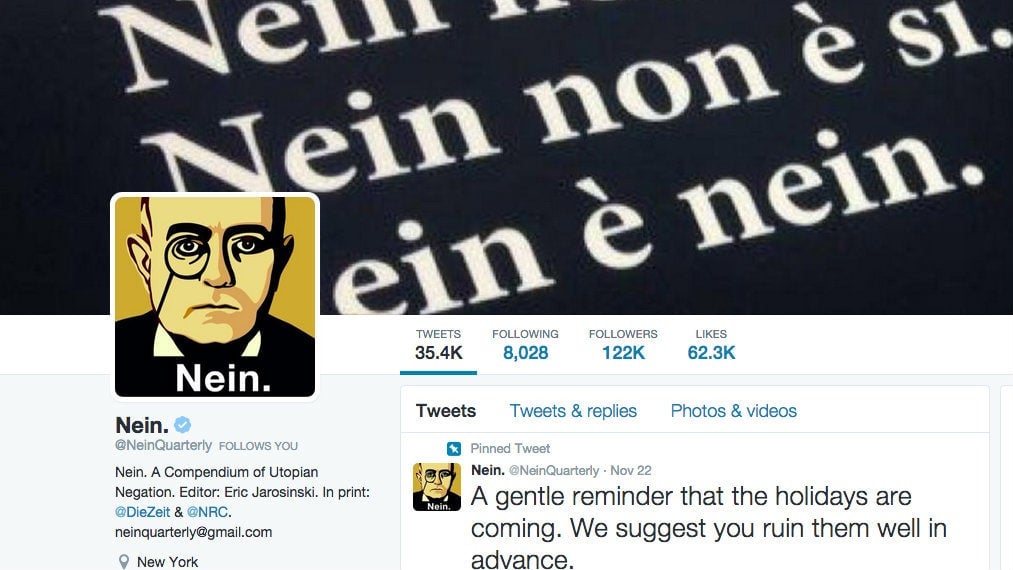“But my rage is the machine”: Using Twitter to make philosophy hilarious
A Twitter-based job was never part of the plan for Eric Jarosinski who, until two years ago, was an assistant German professor at the University of Pennsylvania. But the man behind @NeinQuarterly, a darkly comic Twitter account that uses a cartoon of the German philosopher Theodor Adorno as an avatar, says that academia turned out to be excellent training for comedy.


A Twitter-based job was never part of the plan for Eric Jarosinski who, until two years ago, was an assistant German professor at the University of Pennsylvania. But the man behind @NeinQuarterly, a darkly comic Twitter account that uses a cartoon of the German philosopher Theodor Adorno as an avatar, says that academia turned out to be excellent training for comedy.
“I think it’s been helpful in that much of my academic work was about exploring tensions and contradictions—in language, society, concepts, ideologies. And that’s the stuff comedy is made of,” he tells Quartz.
His Twitter feed manages to combine humor with the somewhat gloomy perspectives of the German philosophers he once studied, such as Adorno, Walter Benjamin, and Friedrich Nietzsche.
Jarosinski realized that thinkers he studied were a source of untapped comedic material — so much so that he could work philosophy references into the oldest, most basic jokes, and come up with something original. “I used to do the ‘Somebody walks into a bar’ kind of joke, which is like the most tired-out joke formula that exists in this country,” he says, “But the fun thing was, what can you do with that form?”
It turns out, there’s a lot of untapped comedy in philosophical ideas.For example, in his book Nein. A Manifesto, Jarosinski writes:
“#PeerReview | Marx: Right. | History: Wrong. | Foucault: Disciplined. | Power: Unpunished.”
This joke explores the connection between theory and history. “Many people, including Marxist themselves, wonder why the revolution never came about. And this is embracing the position that Marx was right, it was history that was wrong. That’s speaking to a certain absurdity,” Jarosinski explains.
The line “Foucault: Disciplined,” speaks to Foucault having become a discipline. Meanwhile “Power: unpunished,” suggests that another revolution, one that would overthrow power as Foucault saw it, also hasn’t arrived. “Power continues to operate the way in which Foucault says it operates, but we haven’t done anything to change that,” says Jarosinski.
“These are both thinkers that I’m very interested in, and I spend a great deal of time reading, and I have taught with great earnestness. But I guess I’m poking fun at my own earnestness,” he says.
Another recent tweet is less theoretically complex:
“It’s working as dialog but a step removed, it’s just the response. It’s the context of what happened before and after the remark, and you can imagine various contexts in which that might be said,” says Jarosinski.
Jarosinski says he never has to conjure a sense of disappointment for his tweets, because he finds the perspective natural. “Things are filtered through a character but I don’t think I’ve ever written a tweet I haven’t believed in in some way or another,” he says.
And though his primary focus is humor, Jarosinski believes it’s important to treat philosophy in a lighthearted, accessible manner. “A lot of theoretical ideas are not that complicated but they’re shrouded in an aura that makes them seem unapproachable,” he says. “My project in a nutshell is trying to demystify a handful of the great demystifiers.”
The former professor says he quit academia in June 2013 when he realized he hadn’t done enough work to get tenure. Jarosinski says he often felt too intimidated to discuss great thinkers as a professor, and feels he has more “fool’s freedom” to discuss philosophical ideas in his new job. And, having spoken at several universities, he’s met many within academia who feel the same way.
“I try to make it clear that’s about power,” says Jarosinski. He explains:
“Theory has a certain status and power that’s wielded as a weapon, that I find very disconcerting. Often discussions are just a number of proper names being banded about— ‘As we know from Kant, etc.’— but the arguments are never made. And then you take a step back realize that none of us are that sure about what it all means. So you’re a Lacan expert, you’ve got a great deal of expertise on one particular thinker or one particular school of thought. That’s specific knowledge, it doesn’t mean that it’s the more valuable knowledge.”
His new career has won him the praise of Slavoj Žižek, one of the most famous living philosophers, who says that Twitter should be prohibited but, “Nein is the only exception, the only reason that justifies it!”
Though Žižek has been the subject of some of Nein’s jokes, Jarosinski hugely admires him—both for Žižek’s philosophy, and for his humor. “He understands and appreciates the power of a joke,” says Jarosinski. “And that matters. That really matters.”